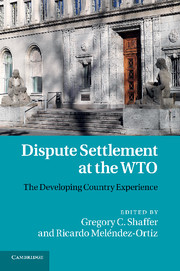Book contents
- Frontmatter
- Contents
- List of tables
- List of figures
- List of contributors
- Preface: The ICTSD dispute settlement project
- Introduction
- Part I Case Studies from South America
- Part II Case Studies from Asia
- 3 China's experience in utilizing the WTO Dispute Settlement Mechanism
- 4 Learning from the India–EC GSP dispute: the issues and the process
- 5 Thailand's experience in the WTO dispute settlement system: challenging the EC sugar regime
- 6 How the DSU worked for Bangladesh: the first least developed country to bring a WTO claim
- Part III Case Studies from Africa
- 10 Conclusion
- Index
- References
5 - Thailand's experience in the WTO dispute settlement system: challenging the EC sugar regime
Published online by Cambridge University Press: 07 September 2011
- Frontmatter
- Contents
- List of tables
- List of figures
- List of contributors
- Preface: The ICTSD dispute settlement project
- Introduction
- Part I Case Studies from South America
- Part II Case Studies from Asia
- 3 China's experience in utilizing the WTO Dispute Settlement Mechanism
- 4 Learning from the India–EC GSP dispute: the issues and the process
- 5 Thailand's experience in the WTO dispute settlement system: challenging the EC sugar regime
- 6 How the DSU worked for Bangladesh: the first least developed country to bring a WTO claim
- Part III Case Studies from Africa
- 10 Conclusion
- Index
- References
Summary
Introduction
This chapter explores capacity-building issues regarding the Understanding on Rules and Procedures Governing the Settlement of Disputes (DSU) by highlighting some of the challenges experienced by Thailand in the European Communities – Export Subsidies on Sugar dispute (‘the Sugar case’). It uses the Sugar case as an entry point to explore the nature of the collaboration between Australia, Brazil and Thailand in bringing that case, as well as the nature of the collaboration between the Advisory Centre on WTO Law (ACWL) and private lawyers. In doing so, it provides insights that could be useful for policymakers, government officials, traders, lawyers, academics and civil society in developing countries who have to deal with the World Trade Organization (WTO), and in particular with its DSU.
The Sugar case was a landmark case brought by Australia, Brazil and Thailand against the European Communities (EC) alleging violation of the export subsidy disciplines of the WTO Agreement on Agriculture, claiming in particular that the EC subsidisation of its sugar exports was inconsistent with its budgetary outlay reduction commitment, and that there was cross-subsidisation under the EC sugar regime. This case received a lot of attention worldwide, since it had significant impact on the interpretation of WTO Members' subsidy reduction commitments under the Agreement on Agriculture. Additionally, there were twenty-five third parties in the case. Some of these third parties had called upon Australia, Brazil and Thailand (‘the complainants’) to withdraw their requests for the establishment of a panel, even though the complainants were exercising their legitimate right to use the WTO dispute settlement system, having ‘exercise[d] [their] judgment as to whether action under these procedures would be fruitful’.
- Type
- Chapter
- Information
- Dispute Settlement at the WTOThe Developing Country Experience, pp. 210 - 229Publisher: Cambridge University PressPrint publication year: 2010
References
- 2
- Cited by



